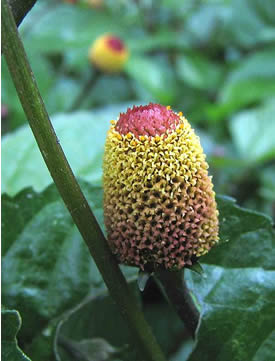Spilanthes Spilanthes acmella
- Common Names
- Spilanthes
- Botanical Name
- Spilanthes acmella
- Syn. Spilanthes oleracea, Acmella oleracea
- Family
- ASTERACEAE
Medicinal Uses & Benefits of Spilanthes
![]() How to Use|
Side Effects |
Plant & Garden|
How to Use|
Side Effects |
Plant & Garden|
- Medicinal Uses: * Athletes Foot/Ringworm
* Dental/Oral Care
- Properties: * Analgesic * Anti-inflammatory * Antifungal * Purgative * Vermifuge * Vulnerary
- Parts Used: Leaves, stems, flowers
- Constituents: spilanthol, stigmasterol, stigmasteryl-3-o-b-d-glucopyranoside, triterpenes
How to Use: Spilanthes
In Brazil spilanthes is commonly referred to as the toothache plant for its ability to numb the gums and mouth and calm tooth pain when the flower buds and new leaves are chewed. Spilanthes works in a similar fashion to echinacea in treating painful canker sores. 1 Spilanthes has antibacterial and antifungal properties making it an good purifying herb used for disinfecting wounds and curing ringworm infections. Spilanthes is also used as an antiparasitic and native remedy against malaria in the tropics. More study is needed on the medicinal uses of spilanthes before we understand the full extent of its uses.2
Preparation Methods & Dosage :The fresh leaves and flower buds make be chewed, steamed and eaten as salad greens. Spilanthes is traditionally taken as a tea, and can also be used as an alcohol extract.
Spilanthes Side Effects: None noted in the literature, however it is listed as a purgative so excessive amounts would likely make you throw up.
Plant Description
This handy plant grows well as an annual in temperate zones and makes a striking addition to your herbal garden.
Regional Traditions :Central and South America *
How to Grow Spilanthes
Tropical perennial can be grown as an annual in the north, needs full sun and plenty of water.
- Abascal K, Yarnell E. "Treatments for recurrent aphthous stomatitis". Altern Complement Med. 2010;6(2):100-106. American Botanical Council
- Mountain Rose Herbs
Spilanthes (Spilanthes acmella) has some chemical similarities to echinacea (Echinacea spp.). Spilanthes works wonderfully to reduce inflammation, relieve pain, and speed healing of ulcers.












